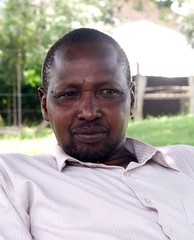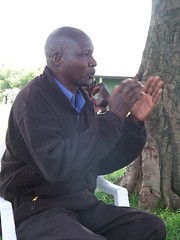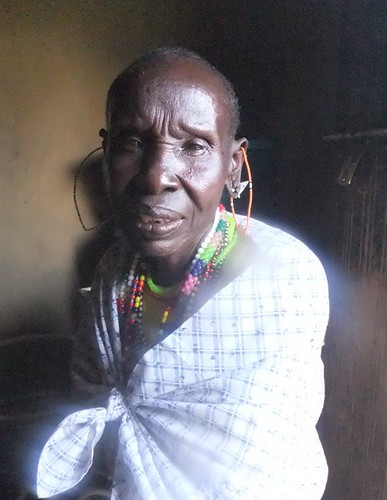On Wednesday I met another captivating figure in the anti-FGM scene. Paul Ole Sire might at first glance seem to be a patriarch steeped in tradition; he is a man with 4 wives and 24 children, after all. Yet he is perhaps one of Enoosaen’s most interesting agents of change for the oppressive cultural traditions towards female children.
Ole Sire is a resident of Enkiloritet, a rural area from the surroundings of Enoosaen – the type of remote area people from the center of the village call “the interior”. In the mid-nineties he began to take a highly unpopular stand against early marriage of girls and female genital cutting. Although all those wives and children may have given him a large captive starting audience, getting his message across has been an uphill battle. The example he began setting back then, however, has slowly taken on more followers over the ensuing 15 years, and his home has become a true locus of change.
How did this man become the relatively quiet, stern force for change that he is today? It had nothing to do with curricula or seminars. Paul Ole Sire didn’t go to school, but during his time as a moran, he was chosen as the age mate leader for the young men in his area at that time. As a moran leader Ole Sire married all four of his wives (leaders get a lot of visitors and somebody has to cook for them, my translator explained to me) and he saw both the good traditions of the Maasai and the bad. Around 1996 Paul became a Christian and joined the International Fellowship Church, which he credits with having produced a profound change within him. God’s word, he says, changed the way he thought, and the bible gave him a general impetus “to become someone who listens to and cares for others.” That era, however, seems to only have reinforced ideas he had held long before about wanting to provide education and opportunities for his girls. Before God or laws for compulsory primary education or NGOs griping about FGM, Ole Sire says he came to his progressive ideas through his experiences of watching the women in his community be wasted, uneducated, and thus unable to contribute their full potential to their families and their communities.
So what are these radical positions?
With regard to circumcision, Ole Sire says it used to be something that he thought was good to celebrate, as he did when his only circumcised daughter chose to be married and to undergo the initiation ceremony. Paul has fifteen daughters, of whom 3 are married (all married at age 20 to a suitor of their choosing), but of whom only the eldest has been circumcised. According to Maasai tradition, a girl’s circumcision signals that she can be given for marriage, and Paul realized that the mere act of circumcising a girl changes the way she thinks about herself and her future; as Paul sees it, circumcising a girl changes her not only physically but mentally. Marriage and children begin to consume her thoughts to the point of distracting her from her studies, he says, and he rejects putting girls in that mindset.
Paul wants to set an example so that the community can copy from him. He refuses to allow his girls to be circumcised or to marry into a family that might insist on it down the line. He also refuses for his sons to marry a girl who has been circumcised. The number one concern that people have is the belief that not being circumcised means you will never get a husband. “I’ve stopped that to set an example to others to be free.”
As far as education goes, Paul says he cares about girls’ education because “education to a girl child is very important in her life, and that one educated girl brings enlightenment to others in the area.” Education also keeps a child from being married underage and “brings her up to an age when she can reason and make decisions for herself.”
Paul is a man who is not only making waves, but is a firm believer in the ripple effect of those waves.
He knows what he can do by using his status as a social leader to set an example and make change. Talking to Ole Sire I was extremely impressed with how well thought out his positions and strategy are.
At first, he says, it took him time to realize how powerful his example is and what effect he might have. Again, he did have his first daughter circumcised for her marriage, but after that he started to refuse the practice, and this caused strife between him and his wives. They were tremendously concerned about the marriagability of their daughters. Yet after the first marriage of one of his uncircumcised daughters, he says the celebration was even larger, and he began to see that this too is a way to bring people together.
These days, if a mzee (elder) and a suitor come for his daughter, the first question Ole Sire asks is, “as a Maasai how do you feel about the fact that my daughters are not circumcised?” They have a lot of questions, and Paul sends them home to make the choice between son and parents-in-law about whether that will be acceptable to them.
That first marriage of an uncircumcised girl was a turning point in his area– Ole Sire’s daughter had fallen in love with a boy, the boy had come to ask for permission to marry her, and had gotten his family to accept her while also agreeing that it was ok for her to be uncircumcised. From that point on, people started to hear about Ole Sire’s daughters’ success at finding a husband despite their being uncut.
People started to find strength in his example.
Now people are talking about the fact that they are rejecting FGM on the basis of Paul’s leadership. I interviewed Paul under a canopied tree as we sat in plastic garden chairs arranged in a circle with about 8 other men. When asked if he doesn’t mind being interviewed in front of 8 others, he jubilantly explained that at this point he would take the interview in front of a thousand. How silly of me to expect that after all these years he might somehow still be cautious with his words.
It has not only been the community that Paul struggled to convince, however. Even his daughters have taken time to come to terms with the household rules. When I ask Paul if his daughters have ever asked to be cut themselves, he laughs. “Of course – four of them came to me together!” Apparently on the day of two of his sons’ circumcisions (which happens during the teenage years), the girls came together, spoke to their mothers, and decided to request that their father “not leave them behind” as their brothers got to go through the initiation ceremony. Paul put a stop to it that day by telling his children that they should “never expect that from [him] as a father.”
I also had a chance to speak to one of Paul’s wives and his mother in law about how they have felt about Paul’s taking up arms against these traditions. While Paul told me that no, his children had never been made fun of or encountered social problems because of the family’s position on genital cutting, his wives told me a different story. According to them, the children themselves are silent about their family’s stance, and the girls are “still hiding” the fact that they aren’t undergoing the cut. The mothers, however, seem to have been won over – now, they say, they see the cut as a costly waste of money and resources. They wonder, “why spend the money on the ceremony if it serves no purpose?” – the most revealing part of which is that they see the cut as serving no purpose. In a community where girls have traditionally been seen as incapable and perpetually in girlhood without being circumcised, hearing a room of women speak this way proves a radical transformation from twenty years ago.
When talking about female circumcision, I like many others am troubled by the nagging thought that maybe it is just a little culturally imperialist for the West to decide which customs are ok for others and which aren’t. Personally I generally subscribe by a position that Nicholas Kristoff clearly articulated in his op-ed on FGM last week: “some cultural practices are…too brutish to defer to.” It is nonetheless reassuring to me when someone like Paul’s son, Joseph, tells me, “the people around us see us as against the law of the Maasai land. We’re thankful to have someone here who actually wants to talk about these issues.”
When asked what we, as concerned parties, have to do to generate social change around these traditions, he really gets to something that a lot of people miss: real change doesn’t take seed with any institution or lecture.
“We tried to use the church and we were defeated,”
Paul says. Often only one family member or the other goes to church, so one parent might still insist on genital cutting or early marriage. Beyond that several people only show up to church “from January to November,” he says, and disappear in December, the school holiday during which most female genital cutting takes place.
“The government also used its mechanism and was defeated,”
he continues. Although female circumcision is now illegal in Kenya, Paul gives a disheartening example of how little the local government is willing to do to implement the law. There is a chief that when he meets Paul in town, they do not greet each other. This chief had been taken to a government sponsored anti-FGM seminar and sent back with letters about the illegality of FGM to distribute to his constituency. Shortly after, however, the chrif started circumcising his own girls. Ole Sire joined with a small numbr of men to go to the District Officer to say “you sent us information about FGM so why is it that our chief is doing this? Who will stop others from doing it, if not the chief?” The D.O went to the chief’s place and tried to put a stop to his practice of circumcising his daughters, while also making him sign that he would enforce the law locally. Still, the community elders approached the chief and told him that if it is a matter of him being removed as a chief or not circumcising his daughters, he should still do it. And so the chief carried on with his circumcisions. Ultimately the D.O. did make him give up his position as chief. Still, Paul has continued to find that reporting families who are cutting their daughters is ineffective because if nothing else, people continue the practice as a quick, secretive ceremony done in the dark of the night and in hushed voices, as opposed to the celebratory ceremonies which used to take place.
All agents of true change are going to be seen as a heretic at one point or another, and reporting parents who want to circumcise their girls or marry them off, and also protecting girls who run to him as a safe haven, has earned Paul enemies as well as followers. Some people have avoided him, some have expressed disgust, but as the ideas have become more palatable community-wide, “now they are coming back as friends.” Ole Sire is quick to remark, though, “one that has helped my life is that the community respected me from the beginning….in this community if you have never had a big role or importance, the community will ruin you if you do something like this.” At the end of the day, most powerful mechanism Paul Ole Sire thinks we have to rally against oppressive traditions is supporting open minded individuals;
“We need people to be our examples. And we need examples in numbers.”
Paul may be a firm and inspiring role model, yet he is only one man and he can only do so much. He mentioned to me that he has run into some dead ends while trying to stop early marriages and female genital cutting. “You can stand firm and campaign for all of this and you end up being an example. You also end up with people running to you to be a shelter but you don’t have enough resources to help and protect them.” Because he lives next to a church, several young girls have used a visit to church as a guise for a secret escape to Paul, hoping he will care for them and shield them from their families. Yet he doesn’t have the means to support them all and send them to school, so he tries to mediate between them and their families instead.
When asked if he knows if any of these girls have ended up being circumcised, he is almost startlingly nonchalant as he confirms, “sure, several.” Can we hold this against him? All in all, I don’t think so – he plays his role and does what he can. But it does make me wonder; what is the most effective way to maximize the headway that individuals like Paul are already making and support their efforts?
Posted By Charlotte Bourdillon
Posted May 20th, 2011







2 Comments
sara
May 23, 2011
What a wonderful , intelligent and forward thinking man.He is right of course that there need to be more well respected individuals to take a stand. An excellent piece, charlotte!
iain
May 27, 2011
Another really good and detailed profile. Here’s a father who values his daughters. And he’s clearly beginning to influence other fathers. A key agent for change! Is there any way the Center can help him and others like him?